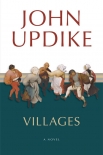Villages by John Updike (best summer reads of all time .TXT) 📗

- Author: John Updike
Book online «Villages by John Updike (best summer reads of all time .TXT) 📗». Author John Updike
Back in Cambridge as a sophomore, he found the squeeze slightly lessened; Owen knew the ropes now. In September, he ventured across the river to see the Braves play the Phillies; he rooted for the Phillies but kept it to himself, in the shirtsleeved crowd whose skimpiness foretold the move of the franchise to Milwaukee within a year. The symmetrical eight-team leagues of his boyhood, as immovably fixed, he had thought, as the Ten Commandments, were beginning to shift and slide across the country. On a Friday night in November he and a pack of five other future engineers took the subway at Kendall and walked up Cambridge Street to the Old Howard at Scollay Square, which itself would soon disappear. Before a somewhat sardonic all-male audience of sailors and geezers and college boys, a glittering woman with an implausible cinnamon-red upsweep strutted in fewer and fewer clothes and ended up on her back on a velvet chaise longue kicking her legs in the air in a sufficient pantomime of orgasm, while the drums in the orchestra pit pounded. Under the harsh stage lights, well-used, half-amused women went through routines that did not seem lifeless to Owen; in feathers and breakaway ball gowns and hourglass corsets and ruffled garters and satin heels, these women had the pure life of dreams, dreams sent up from the pit of oneself, fantastic enactments of what was at bottom most real.
A New England daintiness and wit leavened what in Pennsylvania, in the milltown brothels and dives, had a sullen, suety heaviness, slightly rancid. Up here, where the Puritans had left their traces in the white steeples and prim brick architecture, sex was tricked up, if not altogether banned. Boston’s highly evolved civic morality prescribed certain limits on costume. Pasties on the nipples, G-string on the pubis, high heels on the feet, tiaras on the head, bright paint on the face—all mitigated the simple glimmering nudity that Elsie in her innocence had offered him one night. Nudity, New England seemed to say, was too serious, too vulnerable, to commodify; only goddesses in marble or Mother Eve in crabbed engravings could flaunt it aboveground. Underground, there were stag films in frat houses, projected to uneasy hooting, starring actors and actresses whose sagging, pouchy, wistful, and impotent humanity roused scorn in the viewers, young and inexperienced as they were.
In his sophomore year, then, after a summer of the surveying crew and a few unsatisfactory dates with Elsie, who was more guarded and sparing of herself now that she was a Penn State freshman, Owen returned in his daydreams to Phyllis, without ever having spoken a word to her. But she turned up in a class that he too was taking, Introduction to Digital Computer Coding and Logic:
Survey of principles of logical design and of the elements of coding programs for large-scale digital computers, discussed from the user’s point of view. Brief descriptions of the logical structure of digital computers operating at M.I.T. and elsewhere. Interpretation of sequences of arithmetical and logical operations into digital computer instructions, with examples chosen from typical engineering, scientific, and business problems and from real-time control applications. Techniques for simplifying and improving the programming and operating of computers by the use of subroutines. Execution on the M.I.T. Whirlwind I computer of examples discussed in class to provide first-hand experience with automatic high-speed machines.
v. How Phyllis Was Won
You’re getting all of this?”
It was an awkward, side-of-the-mouth kind of ice-breaker, addressed to the tall sandy-haired girl as, having spotted her momentarily alone in the post-class rush and quickening his steps, Owen drew abreast of her in the long hall.
Her eyes as she darted to him in polite surprise were a blue so mild as to be gray, like her winter coat, which he thought of as the color of a dove in the distance. Her eyebrows and lashes were almost colorless, and her mouth as she spoke had an intriguing frozen quality, a delayed way of moving, her whole face delicate as if outlined in silverpoint, though shot through with living tints of pink. Her eyelids were pink, and the tip of her nose, and the crests of her slanted cheekbones. “Oh,” she said cautiously. “I think so. It’s all so lovely.” Her reply had a certain soft bounce to it, suggesting that she had been waiting for him to approach her, having sensed that he wanted to. They were some weeks into the course; leaves were turning, football was being played at more frivolous universities, and her nose still showed a bit of sunburn, achieved lying on a blanket in the grass, in the Great Court or down by the river. Strange, Owen thought, how sun-worshippers often have unsuitably fair





Comments (0)